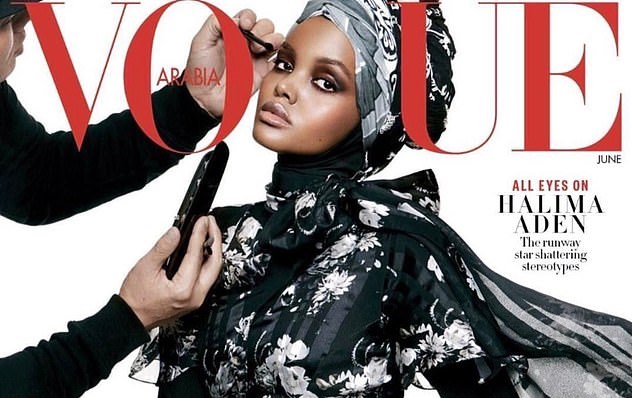

Hijabi model Halima Aden has been named Vogue Arabia’s new Diversity Editor-at-Large.
On Thursday, the magazine announced that the 22-year-old Somali-American beauty ‘further[ing] the magazine’s commitment to showcasing diversity, racial inclusivity, and topics related to human rights’ in her new role.
‘Now, more than ever, using my voice and personal experiences to educate others is at the forefront of my agenda,’ Halima, who was born in a Kenyan refugee camp and moved to the US at age seven.
In a video posted on both Vogue Arabia’s and Halima’s personal account, the model — who covered the magazine for its June 2017 issue — shared her joy over the new role.
‘I’m super proud to announce that I’m joining @voguearabia as Diversity Editor at Large,’ she wrote.
‘I’ll be working together with the team on the promotion of topics such as human rights, race and diversity, and acceptance. I’m looking forward to teaming up with [Manuel Arnaut], the magazine’s editor, to bring you content that is meaningful and relevant, based on my own personal experience.’Ads By GoogleSpeaking to Vogue Arabia, she added: ‘I commend Manuel on his work over the past few years in showcasing a wide range of models from all different backgrounds.
‘I am most grateful that he is bringing me on, once again highlighting the value that Vogue Arabia continues to place on awareness, especially when it comes to topics that most affect those who are not necessarily represented within their current staff.
‘For me, taking on this project was both important and imperative in order to create bigger conversations within the fashion community.’
Arnaut, meanwhile, had this to add: ‘Although Vogue Arabia has always celebrated an inclusive policy — both in its editorial line and team — I believe that in order to create content that is truly effective and meaningful, we need extra support from someone who embodies the values of our time and understands the struggles and all the layers of the topics that society is discussing now.
‘That motivated me to invite Halima Aden to join our team as Diversity Editor-at-Large, helping us to better curate topics and continue our history of catalyzing meaningful discussions on themes relating to equality, inclusion, and human rights. I’m excited to continue our journey together.’
Halima, who has been a UNICEF Ambassador since 2018, has plenty of experience promoting these topics.
In the early 90s, her mother’s village in Somalia was bombed and burned down during the Somali civil war. Afterward, her mother traveled for 12 days to the Kakuma refugee camp in Kenya, where she lived for several years in a house made of ‘mud, plastic, paper, plastic bags, [and] sticks,’ and welcomed two kids: Halima and her younger brother.
They moved to the US when Halima was seven and eventually settled in St. Cloud, Minnesota.
Halima has the opportunity for a better life in the US, but it wasn’t without hardship. At their first stop in Minnesota, Halima didn’t speak English and was quiet and lonely.
Once they moved, things improved, but Halima worked for long hours after school and still found herself in a minority position.
She was the first Muslim homecoming queen at her high school. Later, she was the first Somali student senator at her college.
When she competed in the Minnesota Miss USA competition in 2016, she was the first contestant to walk out in a burkini during the swimsuit portion.
She continued to break down barriers and be the first, paving the way for others by modeling burkinis in Sports Illustrated; covering Vogue Arabia, CR Fashion Book, Allure, and British Vogue in a hijab; starring in a Fenty campaign video ; and walking runways for Max Mara, Yeezy, The Blonds, and Tommy Hilfiger.
This year, she was the first black woman with hijab to cover Essence magazine.
She has also used her influence to shed light on needs that might have otherwise gone unnoticed.
Recently, she collaborated with the brand Anywear on a line of hijabs and turband that come with face masks.
The turbans ($52) and hijabs ($45) come in several different colors.
‘Having worked in a hospital cleaning patient rooms, I really wanted to donate my time. Seeing photos of frontline workers with bruised faces and even blood behind their ears – all from wearing masks — was heartbreaking,’ she told People.
‘Knowing the struggles that women who wear the hijab go through — having to privately go to the bathroom to remove their masks from under their hijab — it was important that these face coverings clasped in back over the hijab like a headband.
‘I really wanted this to be hassle free for hijab wearing women,’ she added. ‘But, more than anything, I wanted them to be comfortable. Part of the job of frontline workers is making their patients feel comfortable and in order for them to best do that, I felt they needed to be comfortable themselves.
‘If we can take just a little pressure off of these women who are working so hard and make them feel good during this uncertain time, that’s a win in my book,’ she concluded.
Source: The Daily Mail
more recommended stories
 Somaliland to Defend Sovereignty Against Somalia’s Provocative Laascaanood Visit
Somaliland to Defend Sovereignty Against Somalia’s Provocative Laascaanood VisitThe Ministry of Foreign Affairs and.
 New Director Appointed: Burao Hospital’s Fall and the Fight for Revival
New Director Appointed: Burao Hospital’s Fall and the Fight for RevivalBurao Hospital begins a new chapter.
 Somaliland: While Mogadishu Burns, Somalia Seeks Chaos in Sool
Somaliland: While Mogadishu Burns, Somalia Seeks Chaos in SoolHargeisa, April 9, 2025 – (Somaliland.com).
 Somaliland Presidency Delivers 10 Vital Dialysis Machines to Hargeisa Group Hospital
Somaliland Presidency Delivers 10 Vital Dialysis Machines to Hargeisa Group HospitalHargeisa – Somaliland – The President.

